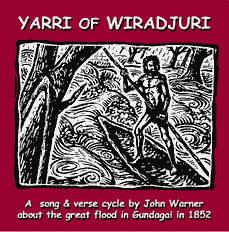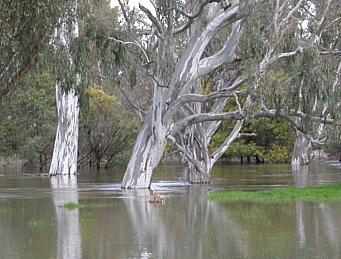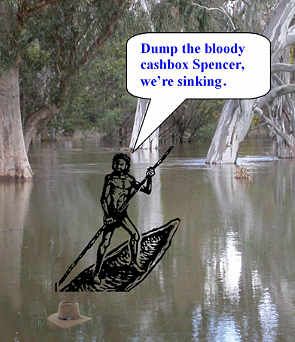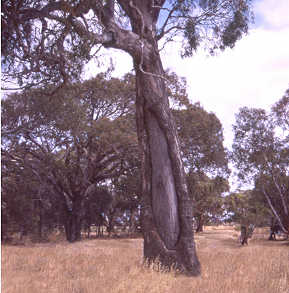 |
Yarri of Wiradjuri
A Song & Verse Cycle by John
Warner
Background
 Characters
Characters
 Tracks
Tracks
 CD
Artists & Production Team CD
Artists & Production Team
 From the Author From the Author
 How John Came to Write Yarri
How John Came to Write Yarri
 Audience Comments
Audience Comments
|
John, highly respected
among his peers for his well-crafted original songs, has a special
talent for interpreting aspects of Australian history and environment
through song. Several years ago, John heard of the little-known story of a Wiradjuri man called Yarri
-- and after a year or so of research and
collaboration, he produced a folk cantata or song and verse cycle he called
Yarri of Wiradjuri.
|
Background
In June 1852, a massive flood
demolished the original township of Gundagai which was then built on the
Murrumbidgee floodplain. Eighty-nine people are known to have lost their
lives. The Wiradjuri people with their
knowledge of the land in all its moods saved the lives of many Europeans.
This story tells of one such hero, Yarri, who was one of the first on the
river, in the deadliest conditions at the height of the flood, in only a
bark canoe. Yarri's is one of the most dramatic stories of
Aboriginal-European interaction and certainly one of very few from an
English perspective in which the Aboriginal people are clearly shown in a
heroic light.
While
the story is well known in the Gundagai region, it not as widely known as it
deserves. John Warner heard of the flood and Yarri's heroism in 1997 and
began writing the series of poems and songs that make up the cycle using the
English traditional folk styles he knows best. John collaborated with
singing partner, Margaret Walters, in writing the piece. During the process,
they consulted with many Indigenous people, particularly the Elders from
Brungle where Yarri came from. Many of the characters in the musical are
based on historical sources; others the Mother and the Daughter are
river spirits from the author's imagination.
The song and verse cycle Yarri of Wiradjuri acknowledges Indigenous ownership
of the land and recognises several aspects of European culpability in their
dispossession. Most importantly, it celebrates the Aboriginal people as
heroes, and contributes to our shared history.
Indigenous performers Matthew
Doyle and Marlene Cummins have joined John and Margaret in performance of
Yarri,
as well as members of the Roaring Forties and Wheelers and Dealers. When it
was shown at Gundagai on the 150th anniversary of the flood in
2002 it was warmly received by the people in the region by people who saw it
as a positive vehicle for reconciliation including Senior Wiradjuri Elder
Flo Grant and Pastor Cec Grant, Wongamar OAM.
Characters
The central characters were selected from the published material available
at Gundagai. The businessman, John Spencer, was a brewer, pharmacist,
storekeeper who had a punt for hire. With an unerring eye for the main chance,
he dispensed with everything, including his clothes, when he swam for his
life -- but not his cashbox!
Thomas Lindley - known as Long Tom, owner of Rose Inn, wool grazier -
lost all his family during the flood. Tom subsequently remarried and became
a prominent character in Gundagai. His descendants are still significant
figures in the local community.
Saddler Richard Hunt, his wife Sarah, and their three children
stood out from the list of dead because they were a family lost together in
the flood. John fictionalised some of what is known to highlight the
conflict between staying on the floodplain for trade and moving to higher
ground for safety.
The story needed some way to dramatise the flood as an active adversary. The
author gave the river a female personality. Since both the Murrumbidgee and
its anabranch, Morley's Creek, were the vehicle of the flood, John depicts
them as spirits, the Mother and the Daughter. This made supernatural
elements possible in the story and creating an opportunity for a dramatic
discussion about the differences between European and Indigenous values.
 |
Yarri -- a Wiradjuri man from Brungle -- worked as a shepherd. He,
Jackey, and
other Wiradjuri, saved the lives of reputedly 49 Europeans during the 1852
flood. The European settlers were very grateful to Yarri and Jackey and
presented them with inscribed bronze breastplates in recognition of their
bravery. Some years later -- in 1875 -- Yarri was baptised as James McDonnell.
He died in 1880 and there are several memorials to his honour in Gundagai. Jackey was an employee of Joseph Andrews and credited with saving at least
20 lives during the flood, using a rowing boat in the style of a bark canoe. Black Sally, Yarri's wife, died on walkabout in 1902.
We only know Yarri by his actions, and thus the recurring song, Yarri of the
River, asks: "Yarri, what kind of man were you?" Yarri speaks for himself
and his people only once - in the song Reward -- a stark statement about the
impact of European settlement and culture on the Wiradjuri people and their
land. |
Tracks
|
# |
Type |
Title |
Time |
Vocals |
Musicians |
Soundbyte |
|
1 |
Verse |
Dark Water Theme |
2:12 |
JD
|
MD JW DB
RC TP |
|
|
2 |
Song |
Landpulse |
1:42 |
JW MW |
MD JW TP |
|
|
3 |
Verse |
Prologue |
1:17
|
JD
|
|
|
|
4 |
Song |
Murrumbidgee Water |
4:13 |
MW |
JW DB TP |
 |
|
5 |
Verse |
Invasion |
0:46 |
JD |
|
|
|
6 |
Song |
White Man Fool (Big Water Come Down) |
2:18
|
JW
|
MD JW CW |
|
|
7 |
Verse |
Canoe Tree
|
0:56
|
JD |
|
|
|
8 |
Song |
Yarri of the River |
2:24 |
DB
|
JW RC TP MD |
|
|
9 |
Verse |
Flood Signs |
1:11 |
JD
|
|
|
|
10 |
Song |
John Spencer's Punt |
3:28 |
JW |
JW RC |
 |
| 11 |
Verse |
Men's and Women's Wisdom |
0:36
|
JD
|
|
|
| 12 |
Song |
Black Sally |
4:09
|
MW JL |
JW CW TP |
 |
| 13 |
Verse
|
Warning |
0:39
|
JD
|
|
|
|
14 |
Song |
Richard and Sarah |
6.08 |
JL RC |
JW DB CW |
|
| 15 |
Verse
|
The Great Flood |
2:07 |
JD |
MD JW TP |
|
| 16 |
Fragment |
Richard & Sarah Lament
|
0:31 |
MW JW |
|
|
| 17 |
Verse |
The Great Flood 2 |
0:45
|
JD
|
MD JW TP |
|
| 18 |
Song |
Yarri's Bark Canoe/Roof Top Shanty |
2:20 |
JW TH
|
MD JW CW |
 |
| 19 |
Song |
What Kind of Man
(Yarri of the River 2) |
1:21 |
DB |
JW RC TP |
|
| 20 |
Verse |
Desperation |
0.36 |
JD
|
|
|
| 21 |
Fragment |
Tom Lindley's Dream |
0:39 |
TH |
TP |
|
| 22 |
Song |
Mother and Daughter |
3:00 |
MW JL |
MD DB |
 |
| 23 |
Verse |
Jackey |
2:14 |
JD |
JW
TP DB CW |
|
| 24 |
Fragment |
John Spencer's Rescue |
0:38 |
JW |
|
|
| 25 |
Verse |
Jackey 2 |
0:45 |
JD |
JW TP DB CW |
|
| 26 |
Song |
Floodpulse |
1:44
|
JW MW |
MD JW TP |
|
| 27 |
Verse |
Jackey 3 |
0:19 |
JD
|
|
|
| 28 |
Song |
Long Tom Lindley |
3:31 |
TH JW |
RC DB CW TP |
 |
| 29 |
Verse |
Aftermath |
0:38 |
JD
|
|
|
| 30 |
Song |
Reward |
2:26 |
ALL |
JW CW DB |
 |
| 31 |
Verse |
Conclusions
|
1:05 |
JD
|
|
|
| 32 |
Song |
Building Bridges
(Yarri of the River 3)
|
2:07 |
DB |
JW
RC TP MD |
|
|
33
|
Song |
Yarri's Requiem |
1:12 |
ALL |
MD |
|
CD Artists & Production Team
The cast for this new production
comprises the author, John Warner,
plus
Robin Connaughton, Jennifer Lees, Tom Hanson, Margaret Walters and Don
Brian. Although most of these are members of the acapella group The
Roaring Forties, the presentation draws on the instrumental skills of
John, Robin and Don. As with most songs chosen by the group, strong
harmonies and choruses abound with opportunities for audience participation.
Recording Ensemble
CW Christine Wheeler: vocals, tin whistle, Irish flute, sticks
DB Don Brian: vocals, tin whistles
JD John Derum: narration
JL Jennifer Lees: vocals
JW John Warner: vocals, 6-12 string guitars, bouzouki,
mandolin, tin whistle, bodhran, clap sticks
MD Matthew Doyle: didjeridoo
MW Margaret Walters: vocals
RC Robin Connaughton: vocals, 6 and 12 string guitars
TH Tom Hanson: vocals
TP Tony Pyrzakowski: violin, viola
Words © John Warner
Tunes © John Warner except Long Tom Lindley (trad.)
Acknowledgements
Music and lyrics: John Warner Arrangements:
John Warner and ensemble Co-producers: Christina Mimmocchi &
David Gilfillan Final mix and mastering: Robin Gist
Artwork: Tom & Jessie Hanson Disc illustration: Tony
Pyrzakowski Pre-production: Margaret Walters Manufacturing:
MAD CDs, NSW
We are very grateful to the SEARCH Foundation for funding assistance, and to
Christina Mimmocchi who made a nine-year-old dream come to fruition; to the
late Pastor Cec Grant, Wongamar OAM, Senior Wiradjuri elders, Flo Grant,
Vince Bulger, and other members of the Indigenous community around Gundagai
who talked with John and Margaret during the creative process.
All those involved in the production of this CD were extremely generous with
their time and talents, especially the members of the Roaring Forties.
Thanks are due to many others including: Gordon and Helen Lindley, Bob
Gilholme, Peter Batey, Pat Sullivan, Allen Crooks, Fay White, John Dengate,
Alex Rivers, Kim Poole, Robert Davidson, Nancy Kerr, James Fagan, Bob Fagan,
Grace Karskens, Rae Frances, Bruce Scates, John Shields, Julie Kimber, Chris
Maltby, Sue Brian, Pam Merrigan, Ged Corbin, Marlene Cummins, Cassia
Lindsay, John Ross, Patricia Early, Wayne Richmond, Maggie Huang, Blackwood,
Emery Schubert, Greg White, David Begg, Kevin Davidson, Lamar Lower,
Eastside Arts, Tony Eardley, Sarah McDonald, UNSW School of Music.
From the Author
As an Englishman, songwriter and poet with a passion for
the myths and legends of the Northern Hemisphere, I was amazed when I first
heard of the story of Yarri. At another place and time, his heroism
would have become folk lore, thrilling generations of people. I was
inspired to write about the event, but obviously could not do so from an
Australian Aboriginal perspective and chose the forms I understand best --
British folksong and poetry. The work also gave me an opportunity to
make my personal apology to the Indigenous people of Australia for their
dispossession.
The Anglo Saxons celebrated the deeds of heroes in epic verse, the best
known example being Beowulf. They had a formal poetic metre
and some of the songs in Yarri, eg Murrumbidgee Water,
use this metre. The work was conceived as a song and verse cycle, rather
than a staged presentation, with the events made clear and characters
delineated by words and music only.
Bush verse and song were chosen because that was the way in which people
entertained themselves before the electronic media and because much oral
history was transmitted in this way. I like to imagine Yarri's deeds
being retold and celebrated around the pubs and taverns, and in many an old
wood-fired kitchen under lantern light.
--John Warner
How John Came to
Write Yarri
John Warner has often been asked how he came to write "Yarri
of Wiradjuri'. Collaborator Margaret Walters tells the story
John was visiting my home in Sydney in 1997 when he received a phone call
from Fay White, a fellow songwriter with a keen interest in ecology. Fay had
been attending a Land Care conference in Wagga Wagga and had heard about the
Murrumbidgee flood of 1852 which destroyed the original township of Gundagai.
Apparently, the indigenous people had warned the white settlers about the
likelihood of major flooding. Fay learned of the heroism of Wiradjuri people
who had saved the lives of many Europeans. This was a tale of epic
proportions which Fay felt John could do justice to.
I could hear John's excitement mounting as he heard the story and soon he'd
taken himself down to Gundagai to get the lay of the land, walking the
surrounding hills, looking at the river and the last remaining building from
the time of the flood, and picturing the devastation caused when massive
logs and debris were borne down the river in that fearful torrent. John
absorbed the local stories, viewed the resources in the museum, talked to
indigenous people, and families whose forbears had been affected by the
flood.
John came to Australia at the age of 10 in 1960, settling in Leongatha,
southern Victoria. Neither his English nor Australian education taught much
about Aboriginal culture as it focused mainly on English politics. Two
strong aspects of his upbringing were folk music and poetry, the primary
influence coming from his mother who would sing or recite with no
provocation at all. John's interest in writing included the works of
Kipling, Tennyson and the poetry of the Vikings and Anglo Saxons. Lawson and
Patterson were accumulated in Australia. Add to this a hands-on interest in
blacksmithing, traditional crafts and industrial archaeology, and we have
the roots of John's writing.
Although John began writing songs in his university days, it wasn't until
the early 1990s when he was working as a volunteer at the Coal Creek
historical mining village in Gippsland, Victoria, that Australian history
really seized his imagination. From this period come the songs which are
recorded on the CD Pithead in the Fern. These songs -
Anderson's Coast, the Miner's Washin', Dear Diary, Fires of
'98 etc demonstrate John's remarkable skill with words, his fascination
with tools of trade, his powers of observation, his ability to conjure up
landscape as it was 100 years before, his imaginative story telling, his
touches of humour, and his sensitivity to all sides of a story. John is
objective, but asks the hard questions - as he does in the song Where
Have the Kurnai Gone? John sometimes draws his tunes directly from
traditional folk themes, Great Southern Navvy, for example, but
mostly they are quite original - the result of steeping himself in many
musical genres.
So in 1997, when John came to write the story of the Gundagai flood, he
brought all his skills and experience to bear in what he saw as a song and
verse cycle - a folk cantata. The story unfolds like a Greek tragedy - you
meet Richard and Sarah Hunt - hear them discussing the warnings of the flood
and their decision to move to higher ground in July - but we know the flood
is coming in June and that this family will not survive. And then there is
Yarri, a man whose deeds should be common knowledge like those of Simpson
and his donkey. John uses the Anglo-Saxon tradition of singing the deeds of
the hero, emphasising the magnitude of Yarri's response. John is not a
romantic writer; he is not thinking here in terms of a "noble savage", he is
using the media he knows best to celebrate a hero whose deeds should be
honoured, whatever his race.
It has been suggested that Europeans have no right to tell the story of a
Wiradjuri man. John would point out that the central protagonists in this
story are all British. The Wiradjuri lose nothing and gain much by having an
Englishman tell, in English words to an English-speaking audience, the story
of English ignorance, racism and stupidity and the generous and unimaginable
heroism of the Wiradjuri. John saw his writing as his apology to the
Aborigines of Australia and he puts the case very powerfully in the song
Reward. The penultimate song - Building Bridges, is a compelling
statement about reconciliation. This is a story of shared history and it is
to be hoped that John's telling of the story is but one interpretation of a
tale that should be told again and again.
During the process of writing the songs, John and I sought advice from
people at the Koori Centre at the University of Sydney, representatives from
various Aboriginal Land councils in Sydney and in Tumut/Brungle. Late in
1999, I accompanied John to Gundagai and we met with Vince Bulger, a
Wiradjuri elder, to ask him if we were on the right track. He said that if
this was about Yarri, then it was good for Gundagai and good for the
Wiradjuri people. Flo Grant has been another senior Wiradjuri elder who has
been very supportive of the project.
There have been several live performances over the years, mostly at folk
clubs around Sydney and at festivals, notably the National Folk Festival in
2000. In 2002 on the occasion of the 150th anniversary of the great flood we
had our biggest production in Gundagai. Pam Merrigan worked with a team from
Gundagai to stage a performance that included some indigenous people and
many school children from Gundagai.
In 2005, encouraged by an invitation to perform the piece again in Gundagai,
this time at a reunion of the Lindley family, we were persuaded to go back
to basics - to John's original plan - and present the songs and verse as a
folk cantata. Several folk club appearances ensued in Wollongong, Sydney,
Sutherland, Canberra and the festival at Cobargo. And coincidently, at last
one of the funding bodies we had approached gave us a seeding grant to
enable us to think positively about getting the work recorded. So thanks to
the SEARCH Foundation, and to the generosity of the Roaring Forties, our
producers, Christina Mimmocchi and David Gilfillan, and the not-for-profit
publisher, Feathers and Wedge, the work has at last been recorded.
The recording ensemble includes: John Warner, author and composer, singer
and multi-instrumentalist; myself Margaret Walters, Jennifer Lees, singer;
Tom Hanson, artwork and singer; Robin Connaughton, guitarist and singer; Don
Brian whistles and singer; these six all form the group, The Roaring
Forties; Christine Wheeler, flute and whistles; Tony Pyrzakowski, artist,
fiddle and viola; Matthew Doyle, didjeridoo player; Tony, and Matthew all
participated in other presentations of "Yarri"; John Derum, narrator, a new
voice in the production - the verses formerly being recited by other members
of the ensemble; the decision to have a single voice - a recognised actor -
follows an experiment in Gundagai in 2002, the aim being to consolidate the
role of the story-teller. Christina Mimmocchi, musical director, editor and
producer; David Gilfillan, co-producer, mixing and mastering; and Robin
Gist, mixing and mastering, complete the production team.
Audience Comments
This musical
brings people together in a very positive way. I was very privileged to be
involved in the 150 years memorial of the 1852 flood at Gundagai in 2002. It
was good to see the school children of the town participating in the play.
The musical was very moving and was received very well by all who saw it.
The late Pastor Cec Grant, Wongamar OAM, also enjoyed being part of the
celebration along with the Wiradjuri people who are very proud of Yarri and
Jackey who worked tirelessly to rescue people. The musical tells their story
and I whole-heartedly support its promotion.
Flo Grant, Wiradjuri Elder, Wagga Wagga, NSW
John is a fine folk historian and songwriter with a solid track record of
poignant, accurate, moving songs about Australian life and the history of
"the folk" (eg his CD, "Pithead in the Fern"). He also has a heart for
justice and a sensitivity to all sides of a story. These, plus his attention
to details and his canny awareness of drama and irony, make a brilliant
marriage with his word-smithing skills and truly singable melodies. With
John's songs, I find myself often hit with goose bumps of recognition and
the beauty of the images that unfold as the lyrics roll along.
Fay White, Singer/Songwriter, Maryborough, Vic.
A wonderful production. Congratulations to all performers and thank you for
this living memorial to Yarri who saved my great-great grandfather, James
Gormly in the 1852 Gundagai flood. My greetings and respect to the Wiradjuri
people: I owe my existence to them. Eternal gratitude.
Wendy Varney, Sydney
Some
audience responses from the early performances:
A wonderful & moving way of
preserving a piece of our history
It's not often that white
Europeans acknowledge and venerate aboriginal people, their spirit, and
relationship to the land.
Well done for an unusual
concept and presentation.
Thank you for informing some of us in such a beautiful and moving way.
Hopefully more will listen and open their hearts.
The best thing I've seen at the
folk festival in all the years I've been coming since the first.
Wonderful, creative and moving.
Tunes and words live in the mind, a wonderful production.
An important story and a great
contribution to reconciliation.
Contact John Warner or Margaret
Walters for more information about Yarri of Wiradjuri:
John Warner (02) 9559 3658
Margaret Walters, PO Box 615,
Glebe NSW 2037 (02) 9698 2206 e-mail: featherswedge at
yahoo.com

![]() Characters
Characters
![]() Tracks
Tracks
![]() CD
Artists & Production Team
CD
Artists & Production Team
![]() From the Author
From the Author
![]() How John Came to Write Yarri
How John Came to Write Yarri
![]() Audience Comments
Audience Comments 

